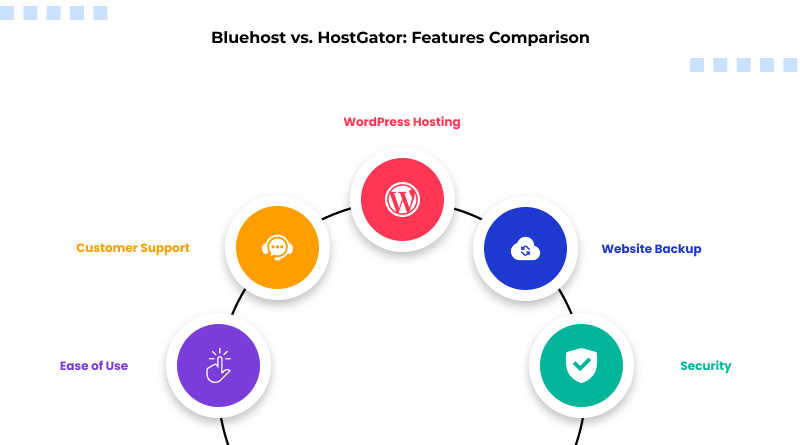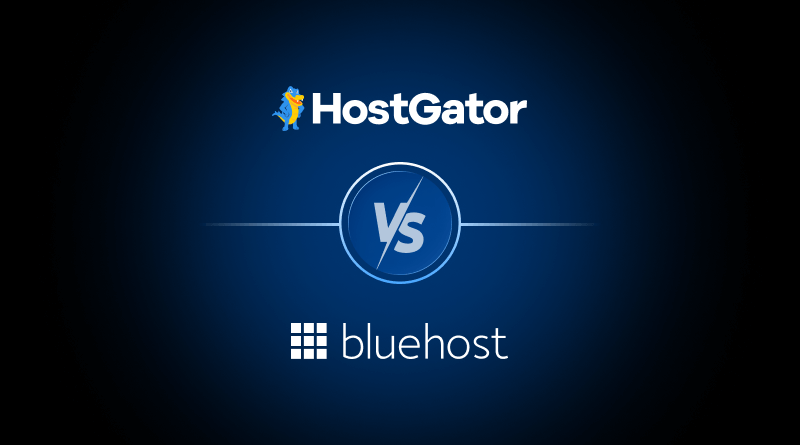Web hosting is a competitive industry, and brand names like MilesWeb, Bluehost, and HostGator are already ruling. You often look for HostGator alternatives, and this blog is the perfect source of information. If you need high-quality web hosting services at a cost-effective price, shared hosting from Bluehost or HostGator won’t be a costlier deal to choose.
HostGator and Bluehost have a major customer base, but there are some key differences in their range of services. This blog gives a brief overview of both web hosts’ features, distinct services, and pricing.
Table Of Content
HostGator Profile
HostGator is a US-based web hosting provider with worldwide consumers. The web host offers shared, WordPress, reseller, VPS, and dedicated hosting. Also, it offers the drag-and-drop builder with domain registration services.
Additional services of HostGator, like website design, backups, PPC marketing, SiteLock, Google Workspace, and an affiliate program, are a part of HostGator’s portfolio. The prices are competitive, and it offers solid customer support to clients.
Bluehost Profile
Bluehost is a reputed web hosting provider offering shared, WordPress, cloud, VPS, and dedicated hosting. Plus, it gives online store options and business email.
You get the extra services like web design, marketing services, and an affiliate program with lots of WordPress resources. Bluehost stands out for its official WordPress.org endorsement and big discounts for new users.
Bluehost vs. HostGator: Web Hosting Plans Compared
Based on the table, a service gap is evident in two web hosting providers, specifically concerning their offerings for cloud hosting and WooCommerce hosting.
Both web hosts, HostGator and Bluehost, offer an identical core service solution. It includes cheap shared hosting, robust VPS, and high-end dedicated server hosting. Content creators and eCommerce store owners are both contenders in the WordPress space. For most users building a standard website, either host will meet their needs perfectly across these primary categories.
Cloud hosting is another service that sets two giants apart. It is an ideal business option to accommodate sudden traffic spikes and requires maximum flexibility. Bluehost offers the scalable web hosting option that offers the cloud hosting plan. HostGator is the better choice based on the comparison point alone. For all other popular hosting types, the decision will come down to price, performance, and support.
Bluehost vs. HostGator: Features Comparison

1. Ease of Use
Both Bluehost and HostGator offer conventional cPanel-based services. For beginners, it will be a daunting task because many users have no navigational idea. But there are several features and actions you can perform in the control panel once you get the hang of it. HostGator offers the traditional user interface in the cPanel. So, it requires the standard setup that beginners may experience as challenging.
Whereas, the Bluehost onboarding experience is sleek. It is easier to set up a web hosting account on Bluehost. The credit goes to their extensive documentation. Referring to these insightful resources gives a great website builder to create websites without hiring a developer.
2. Customer Support
Bluehost assists customers through different communication channels. Providing support through phone, live chat, and email ticketing systems ensures comprehensive assistance for all client technical issues. Clients get the 24×7 technical support 365 days a year. Bluehost’s support team is also active on social media, where they respond to all concerns.
HostGator is highly praised in the customer reviews posted across platforms. The support team response time is better than Bluehost. Bluehost users have reported longer wait times for complicated issues. But HostGator’s expertise is the instant resolution time.
3. WordPress Hosting
Bluehost has a lower subscription plan for WordPress users. However, the WordPress platform has officially endorsed both web hosting companies. But Bluehost wins the battle by providing a comprehensive range of web hosting plans. It offers shared hosting for novices and high-end pro hosting for growing businesses.
HostGator has a limited range of plans, which may restrict the scalability. Or else, users have to upgrade to a better web hosting plan with higher resources and configurations.
Although the two hosting plans in this comparison are towards the entry-level end of the spectrum, it’s worth pointing out that the HostGator plan is aimed specifically at WordPress users and therefore has some nice additional features this demographic should appreciate. However, this also means you’re a bit more limited in what you can do with your hosting account.
4. Website Backup
Both Bluehost and HostGator offer shared hosting. It treats the plan with complimentary backups. But these backups have size limitations, and you are still responsible for the data. Bluehost gives paid add-on features (CodeGuard or Site Backup) for users seeking guaranteed backups and easy 1-click restore.
HostGator’s shared hosting includes a courtesy backup service performing weekly snapshots. To get reliable, guaranteed daily backups with straightforward, free-of-charge restoration, HostGator requires customers to purchase their premium add-on, CodeGuard, separately.
Glossary: A “courtesy backup” is a free, but not guaranteed, backup of a user’s data, such as a website, performed by a web hosting company at its own discretion.
5. Security
In spite of the lack of advanced security features like active malware scanning or removal tools, both Bluehost and HostGator do a decent job of protecting your website.
However, they could both use a little work. A free SSL (secure sockets layer) certificate is included with HostGator’s DDoS protection tool and firewall. There are still no malware scanning or removal tools, and multi-factor authentication isn’t available.
Bluehost claims to provide full security for your site, but it does not provide much information about its security practices. Free SSL certificates, SiteLock malware scanning, and 24/7 network monitoring are included, but the company doesn’t elaborate.
Choosing between HostGator and Bluehost is not an easy win. Both are reliable, high-value web hosts that offer good uptime and customer support. Bluehost offers more WordPress-oriented features. Thanks to its smooth integrations and setup process. Whereas, HostGator is a reliable choice with more flexible plans.
Since both offer a good resource and the best features, evaluate your IT requirements and find the perfect match. Should neither option meet your expectations, consider MilesWeb as an alternative.
FAQs
1. Which provider offers better overall performance?
ZHostGator generally offers better uptime (reliability), while Bluehost often has a slight edge in speed/load time.
2. How do the pricing and renewal rates compare?
Both offer low introductory rates, but HostGator’s initial prices are often lower, and its renewal rates can be slightly less expensive than Bluehost.
3. Do they offer free site migration?
HostGator offers a free migration for one website (usually WordPress or cPanel-based), while Bluehost offers a free migration tool for WordPress but may charge for professional non-WordPress migrations.
4. What kind of customer support does each host offer?
Both provide 24/7 support via phone and live chat, as well as extensive online knowledge bases.




















